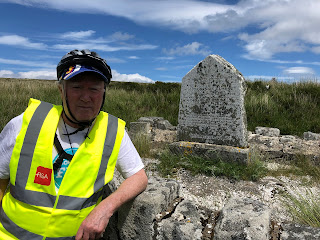Michael Commane
In the late 1960s, early ‘70s while studying in Tallaght it was custom and practice for Dominican students to head to the hills on Thursdays.
We had some popular routes. In the summer there would be a long outing to Lugnaquilla, 925 metres high. It meant a 38 kilometre cycle to Donard, a trek up Ireland’s third highest mountain and then the return journey to Tallaght.
All done within 24 hours.
A less daunting outing was to the Glencree River, close to the Dublin Wicklow border.
On Saturday I decided to retrace my steps, or should I say my wheels, and off I set, with my Italian cycling companion to Glencree via the Featherbed.
Fifty years ago we might meet a handful of cars crossing the mountain. On Saturday it was car after car, followed by roaring motorbikes. But the hills and skies were as beautiful as they were 50 years ago.
We stopped at the Noel Lemass memorial.
Noel was Sean Lemass’ brother, who later served as a progressive taoiseach.
Both Sean and Noel fought on the anti-treaty side. They fought together at the Four Courts, where Noel was taken prisoner. He escaped and went to England before returning to Ireland after the ceasefire had been declared in 1923.
He went back working in Dublin Corporation in his old job as an engineer. On July 3, 1923 he was kidnapped by Freestate soldiers. His body was found the following October on the Featherbed, where the monument now stands in his honour. He is buried in Glasnevin Cemetery. Noel was 26 when he was killed.
Thankfully we have come a long way from those dark days and surely isn’t it good that the two civil war parties are at last healing old wounds.
Someone close to Fianna Fáil said to me when I was telling him that I had stopped at Noel Leamss’ monument, that Noel’s sad ending never defined his brother Sean’s progressive politics.
But it did strike me on Saturday that the monument could do with a tidy up.
If I remember correctly, fifty years ago there was a sign directing people to the monument. There is no sign there now.
And it was the same story at the Jewish graveyard en route to Kilakee.
If my memory serves me rightly, back in the day, there was a clear sign informing people that this sacred place was a Jewish graveyard.
There is no sign there now, and again, the gates could do with a coat of paint. There is a crude lock and chain keeping the gates securely closed.
Most likely for security reasons there is no sign there today. That tells its own story and something about the sad times in which we are living.
I’m wondering why Fianna Fáil isn’t taking better care of the Lemass monument on the Featherbed. And I’m also curious as to why the entrance to the Jewish graveyard looks in such a poor state of upkeep.
It also struck me that the German graveyard in Glencree could do with some TLC.
But one thing is certain: the natural world right in front of our eyes is stunning.
The Lemass monument reminded me of The Wayfarer by Patrick Pearse. In the opening lines he writes: ‘The beauty of the world hath made me sad./This beauty that will pass.’
He wrote the poem in Kilmainham Gaol on the eve of his execution.
Later in the poem he talks about his own imminent demise. A fate we all share.




No comments:
Post a Comment